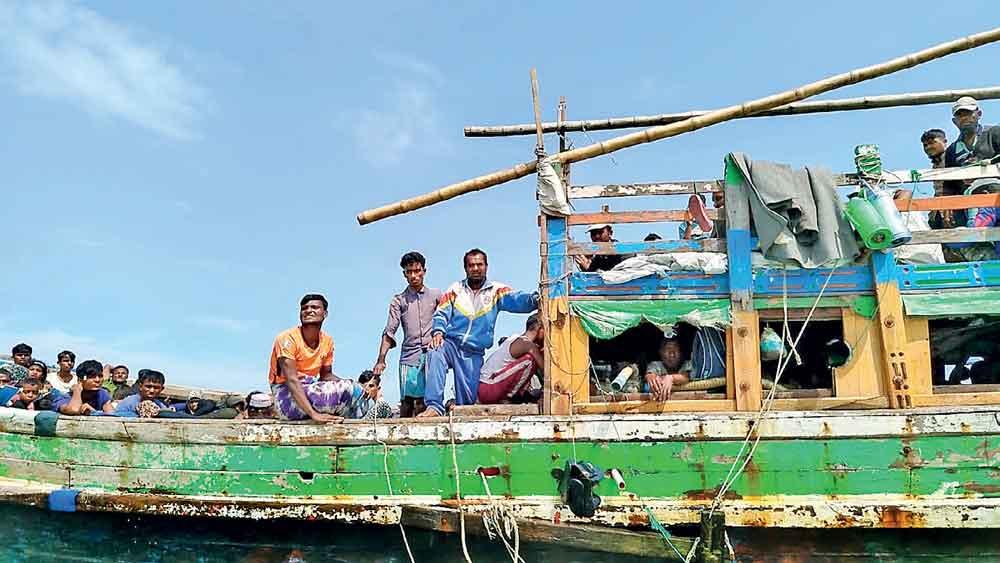Reply To:
Name - Reply Comment

Around 1.1 million Rohingya people are estimated to be refugees and asylum seekers, like the refugees here on a boat off the coast of Mullaitivu. Image courtesy - Social Media
|
Earlier this month, 158 member states out of 193 supported resolutions demanding ceasefire in Gaza in the UN General Assembly Rohingyas fleeing genocide signifies similar incidents against Sri Lankan Tamils in 2008-2009 There have been occasional transgressions, but in general, there has been tolerance towards asylum seekers by the government. |
 Jesus was born in Bethlehem, in Palestine, during a time of colonisation, political and economic oppression by Roman imperialism. Those who dared to call for freedom and justice were brutally crushed. Some were thrown to the lions or crucified in public. This was to instill fear and prevent further uprisings.
Jesus was born in Bethlehem, in Palestine, during a time of colonisation, political and economic oppression by Roman imperialism. Those who dared to call for freedom and justice were brutally crushed. Some were thrown to the lions or crucified in public. This was to instill fear and prevent further uprisings.
Jesus’ mother, Mary, was a young unwedded girl who was courageous to have said yes to God’s call to carry baby Jesus in her womb, as part of God’s revolutionary plan to establish a kingdom of love, equality and peace with justice here on earth. Mary’s fiancée Joseph, a carpenter by profession, was a courageous man who accompanied her in a difficult journey before and after Jesus’ birth, despite the baby not being his biologically. Mary had to give birth to Jesus in a stable (like modern-day-cattle-shed) as there was no room anywhere else, as refugees and displaced people are often compelled to do, especially during wars.
Palestine today and international solidarity
Today’s realities in Palestine appear to be much harsher than when Jesus was born. Palestine is occupied by Israel, supported by America and other powers. It’s a land of genocide and displacement. Humanitarian workers are being prevented from supporting affected persons and journalists are being killed. The situation has led to widespread condemnation around the world. Many diplomats walked out when Israeli Prime Minister Netanyahu addressed the UN General Assembly in September this year, defending Israeli aggression against Palestine. Earlier this month, the UN General Assembly adopted resolutions demanding ceasefire in Gaza and supporting UN’s work for Palestinian refugees, with 158 and 159 member states out of 193 supporting the resolutions with only 9 being against.
There have been protests against Israeli aggression across the world. About two weeks ago, Pope Francis unveiled a nativity scene in the Vatican created by Palestinian artists from Dar al-Kalima University in Bethlehem, with baby Jesus’ cradle draped in a traditional Palestinian Keffiyeh.
Yesterday in Colombo, there was a Christmas eve vigil and a march with the theme that there can be no real Christmas for the world without peace and freedom for Palestine. The march started outside the United Nations building, stopped outside the British High Commission to protest against Britain’s support and other states towards Israeli aggression and ended at the Palestinian embassy. Despite it being around 7pm, the Palestinian embassy opened its gates to enable those participating to share some reflections and light candles.
Rohingya refugees in Sri Lanka
Christmas in Sri Lanka is being celebrated just after the arrival of about 100 Rohingya asylum seekers after a difficult and dangerous journey at sea in a basic boat. Rohingyas are a stateless and persecuted community from Myanmar, who have been compelled to flee their homes, especially since the most recent violence unleashed on them in 2017. The persecution of the Rohingya is now the subject of a genocide case at the International Court of Justice (ICJ). About 1.1 million Rohingya people are estimated to be refugees and asylum seekers across the world, with more than a million of them being hosted in Bangladesh. Before the recent arrivals, Sri Lanka has been hosting about 100 Rohingya refugees who were rescued from the seas in December 2022 by the Navy.
On 19th December 2024, fisherfolk in Mullaitivu in Northern Sri Lanka had observed a boat in the sea, a few hundred meters away from the shore, crowded with many people and children. Together with some Navy officers, local residents had taken a smaller boat to visit them and provided food and drinking water. A local doctor had also visited them. Despite many in the boat being unwell and not having enough food, they were not brought ashore in Mullaitivu by Sri Lankan authorities, and kept at sea most of the day.
By coincidence, Rohingyas fleeing genocide had come to a place which signifies similar incidents against Sri Lankan Tamils in 2008-2009, including the period of Christmas 2008, in the last phase of the war in Sri Lanka. It was a time when babies were born on the move, in camps for the displaced and in bunkers, amidst showers of bombs and shells, while festivities went on in churches, malls, hotels and other places in Colombo and the rest of the country.
In the evening of the same day, after what would have been a long, uncertain and perhaps hopeful day for the people on the boat with land within their sight, the Navy had escorted them to Trincomalee through a further journey by sea. They were finally able to land on the morning of 20th December. They were provided health care and food on arrival and produced before the Magistrate. 12 were remanded for violating the Immigrants and Emigrants Act. Other 103 were reported to have been ordered to be sent to the Immigration Detention Centre in Mirihana. They were temporarily accommodated at a school in Trincomalee on the 20th of December, with local government officials and local civil society groups providing emergency assistance. On 21st December, they were taken in buses destined for the Mirihana Detention centre, but along the way, the buses were turned back and they were taken back to Trincomalee to stay in the same school for a few more days. On 23rd December, they were expected to be taken to the Mirihana Detention Centre, but were instead taken to an Air Force camp in Mullaitivu. Plans for their immediate and distant future are uncertain.
Media reports and other sources have indicated there were three boats, two had sunk and about 5 persons including children had perished at sea. The group that landed is reported to have included about 50 children and 30 women, including one pregnant. The Navy spokesman had indicated to the media that the destination of the Rohingya may have been Malaysia or Indonesia and weather conditions may have pushed the boat towards Sri Lanka.
The pregnant mother Mary was on the move with Joseph just before giving birth to baby Jesus. Immediately after Jesus’ birth, they were again on the move as refugees, fleeing for safety to protect baby Jesus from the wrath of the powerful ruler Herod. Like them, the Rohingyas have been on the move, including an arduous journey at sea and even after arriving in Sri Lanka. It is time for them to settle down and have hope for a more dignified, stable and better future.
UNHCR’s closure
A 2005 agreement between the Sri Lankan government and United Nations High Commissioner for Refugees (UNHCR) allows asylum seekers and refugees like the Rohingya to remain temporarily in Sri Lanka and for the UNHCR to process asylum claims and facilitate permanent resettlement to other countries. There have been occasional transgressions, such as mass deportation of asylum seekers in 2014 and attacks on asylum seekers and refugees in 2017 and 2019, but in general, there has been tolerance towards asylum seekers and refugees in Sri Lanka by successive governments. Now, the UNHCR has decided to close its office in Sri Lanka at the end of this year and this will pose new challenges for Sri Lanka to host, care and support asylum seekers and refugees.
UNHCR must ensure continuation of at least the minimum and most essential services such as issuing of asylum certificates to new arrivals, interviewing and doing refugee status determination of all asylum seekers. They must also make extra efforts to facilitate permanent resettlement of those recognized as refugees, including Rohingyas who were rescued in 2022 and others in Sri Lanka for prolonged periods, including more than 12 years. Various other UN agencies in Sri Lanka working with children, women, food, education, health, housing and development must include asylum seekers and refugees in the work they are doing here. The UN Resident Coordinator must give stronger leadership to ensure protection of rights and wellbeing of refugees and asylum seekers, including coordination with UN agencies and the government. Member states of the UN must assist by facilitating permanent resettlement of the relatively small number of refugees in Sri Lanka.
The closure of the UNHCR’s office also offers opportunities for the Sri Lankan government and society to offer better protection, care and support to persecuted and vulnerable persons amongst us who are asylum seekers and refugees.
They must not be detained in Immigration Centres or other facilities like Air Force camps. The Sri Lankan constitution recognizes the right of all persons (not just citizens), not to be discriminated on any grounds and freedom from arbitrary arrest, detention, torture, cruel, inhuman or degrading treatment or punishment. The constitution also guarantees all persons are equal before the law and entitled to the equal protection of the law.
Asylum seekers and refugee’s rights to housing, food, healthcare must be ensured and rights of children to receive education must be respected, by including them in the country’s free education policy. They must be included in various social welfare schemes offered to vulnerable Sri Lankan citizens.
In the long term, the Sri Lankan government must have a legal and institutional framework to offer permanent citizenship to those recognized as refugees, particularly those stateless like Rohingyas and others who have been in Sri Lanka for prolonged periods. Our adherence to domestic and international legal obligations, hospitality and spiritual, religious and cultural values will be tested on how we treat this small number of vulnerable and persecuted people among us and our willingness to contribute meaningfully to address a global crisis.
May the birth of Refugee Jesus be an inspiration for us to strengthen our love, care, support and solidarity for those most vulnerable, within and beyond modern borders of nation states, such as for Palestine and Rohingyas.
Parts of this reflection were informed and inspired by a conversation with Bishop Duleep de Chickera and his writing.